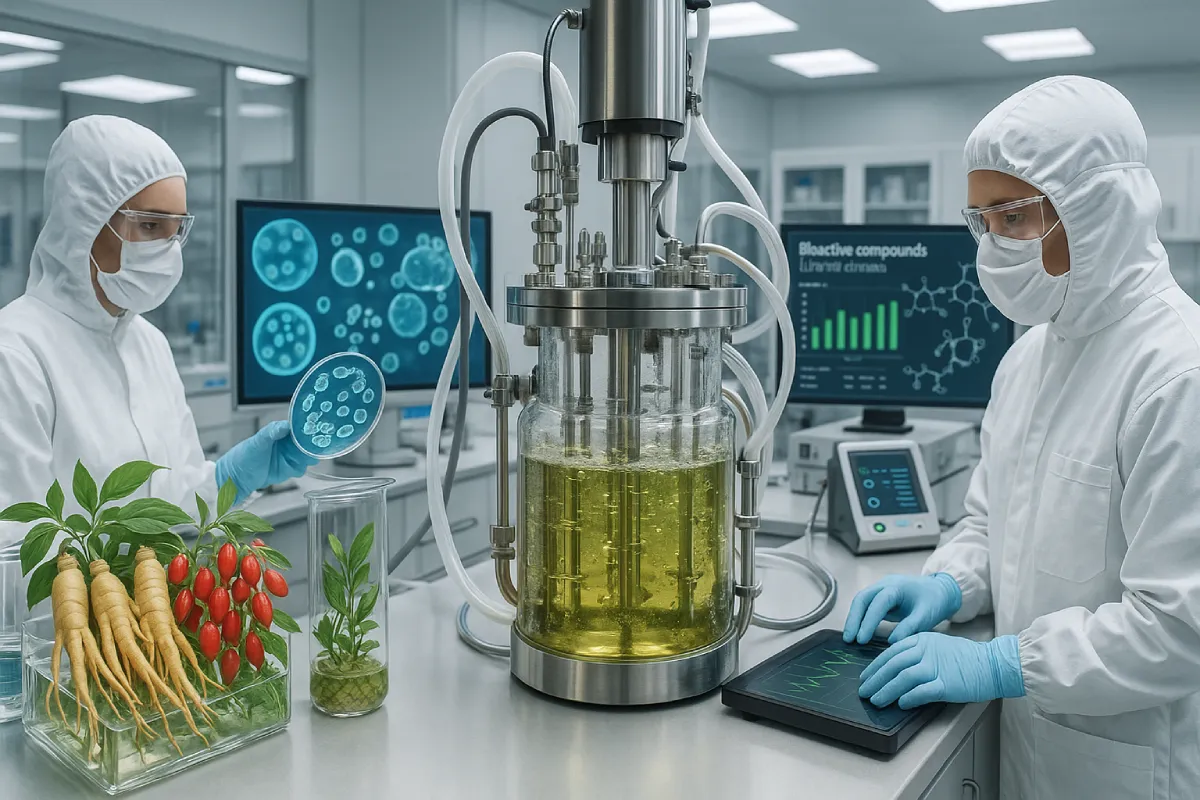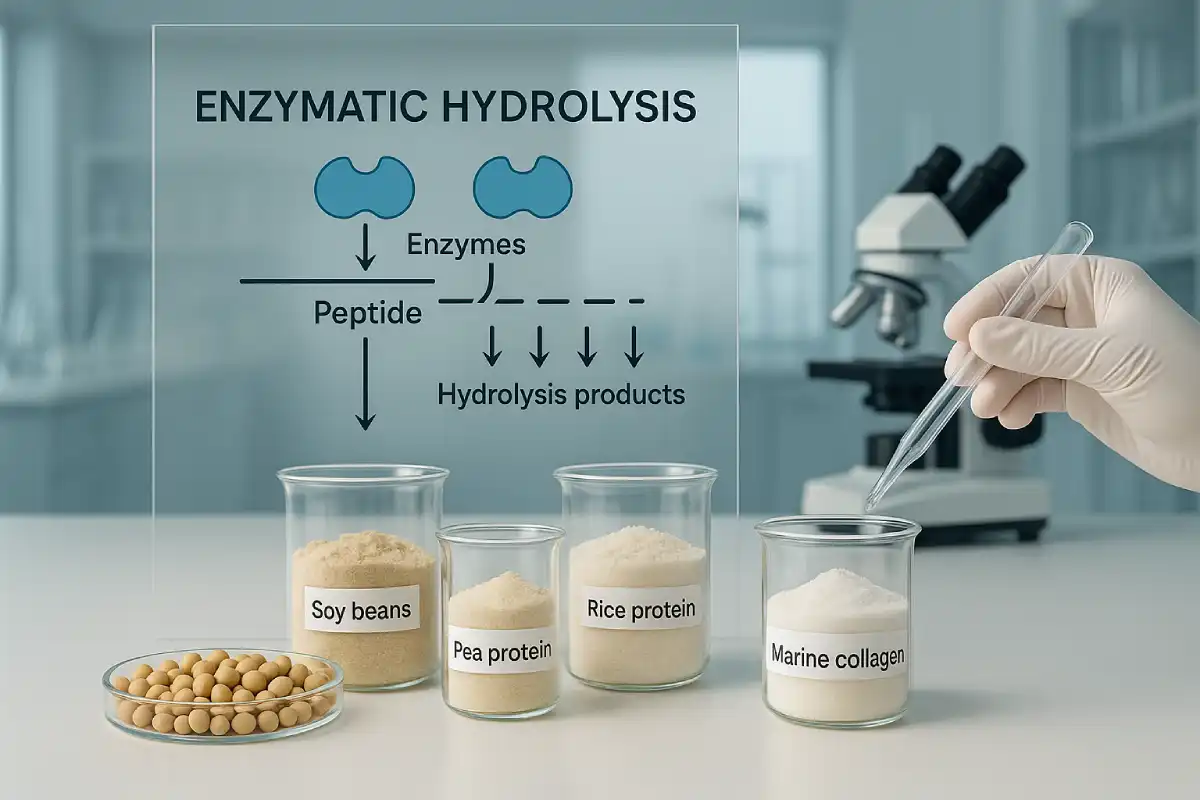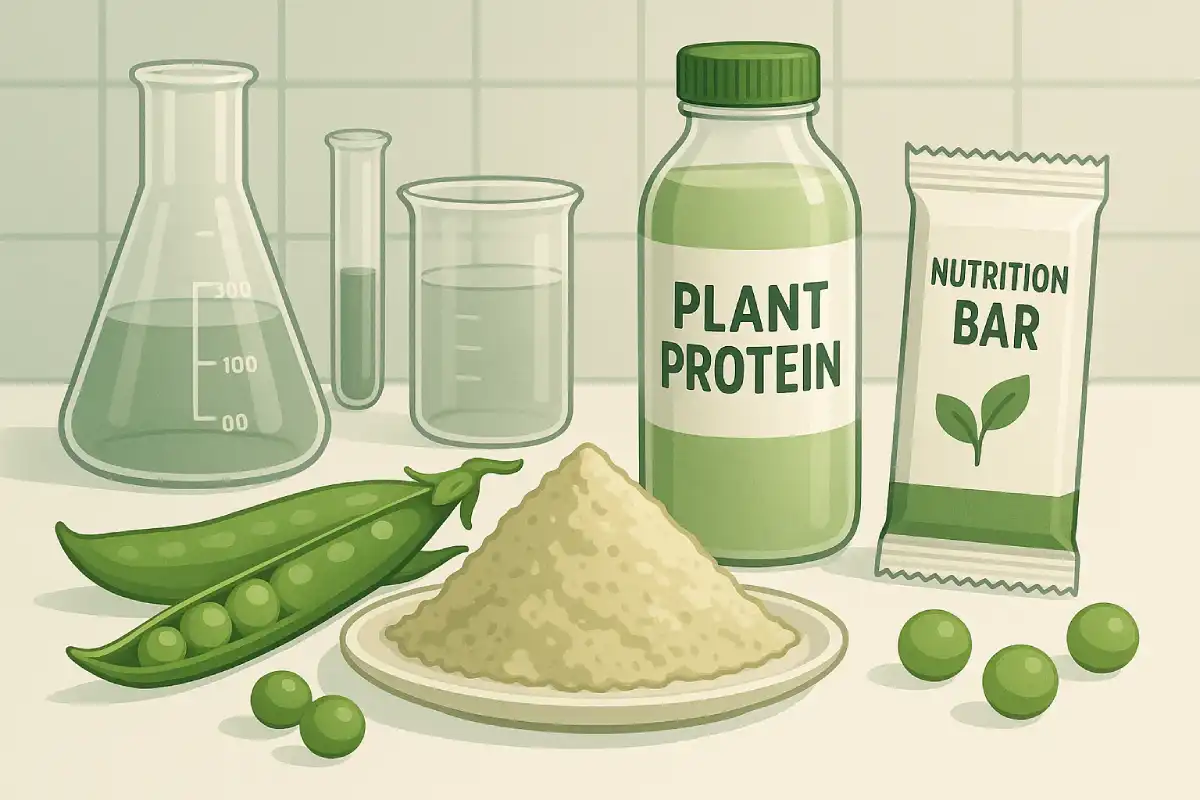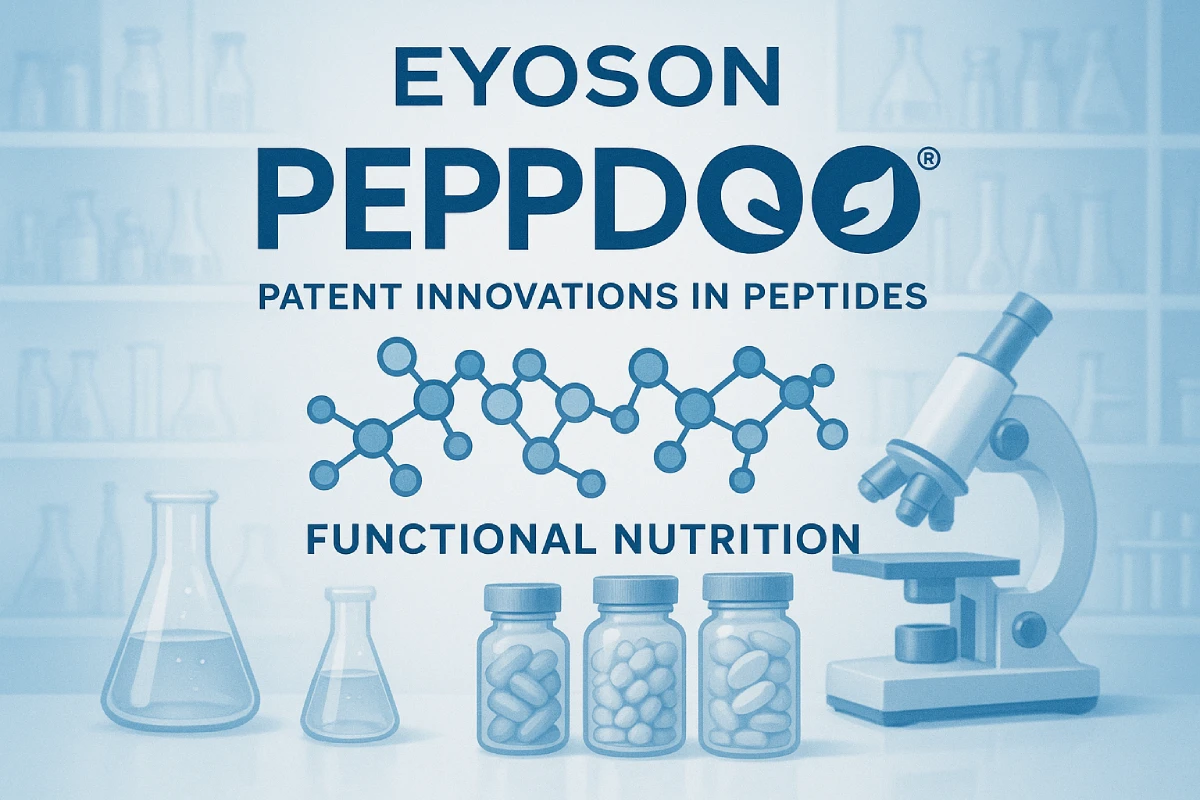Why Bioactive Peptides Are Vital for Functional Nutrition and B2B Brands
With the growing consumer focus on health, functional nutrition ingredients have become increasingly important in the market. Among these, bioactive peptides have emerged as a key functional ingredient due to their diverse biological activities and broad application potential. This article explores the definition, sources, health functions, and B2B applications of bioactive peptides, providing actionable insights for functional food, dietary supplement, and medical nutrition brands.
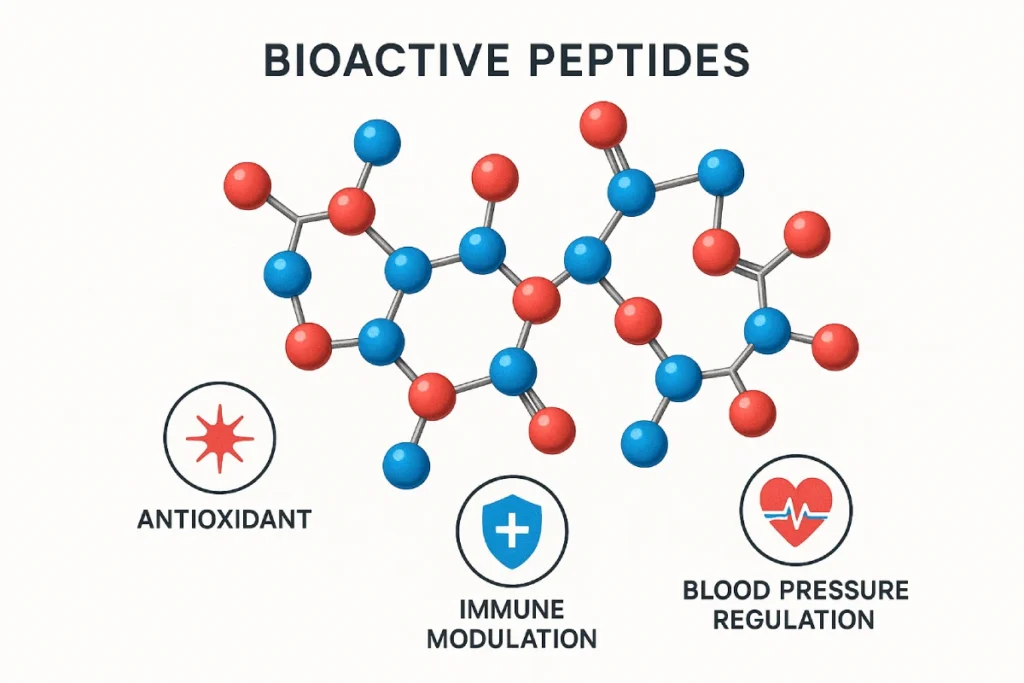
I. Understanding Bioactive Peptides
Bioactive peptides are short chains of amino acids, usually fewer than 20 residues, derived from food protein hydrolysates. Unlike inactive protein fragments, these peptides exhibit specific biological activities in the human body, including antioxidant, anti-inflammatory, antihypertensive, and immune-modulatory effects. Typically, they exist in an inactive form within dietary proteins and are activated through enzymatic hydrolysis or fermentation processes [1].
II. Sources and Production Methods of Bioactive Peptides
1. Sources
- Animal-based sources: whey protein, collagen, fish protein.
- Plant-based sources: soy, pea, rice protein.
- Microbial sources: peptides produced during microbial fermentation [2].
2. Production Methods
- Enzymatic hydrolysis: specific proteases break down large proteins into bioactive peptide fragments.
- Fermentation: microorganisms generate peptides during fermentation processes.
- Chemical synthesis: lab-based synthesis of target peptides.
These methods are chosen depending on the desired peptide functionality and application requirements, enabling the production of peptides with precise bioactivity [1].
III. Key Health Functions of Bioactive Peptides
Bioactive peptides provide multiple health benefits:
- Antioxidant activity: scavenging free radicals to slow down aging.
- Anti-inflammatory effects: suppressing inflammatory mediators to alleviate chronic inflammation.
- Blood pressure regulation: inhibiting ACE activity to reduce hypertension.
- Immune modulation: enhancing immune responses.
- Antimicrobial activity: inhibiting the growth of pathogenic microbes.
- Gut health support: improving intestinal barrier function and modulating microbiota [2].
These functions make bioactive peptides highly versatile ingredients for functional foods, dietary supplements, and medical nutrition products.
IV. B2B Applications in Functional Nutrition
Bioactive peptides are increasingly applied in B2B contexts, including:
1. Functional Foods
Incorporating peptides into beverages, snacks, and nutrition bars enhances specific health functions, such as antioxidant support, blood pressure regulation, and gut health.
2. Dietary Supplements
Peptides are formulated into capsules, tablets, and soft gels to provide targeted health benefits like immune modulation and anti-inflammatory effects.
3. Medical Nutrition (FSMP)
Specialized medical nutrition products target populations such as the elderly, athletes, or patients with chronic diseases, using peptides to meet specific nutritional needs.
Success Cases:
- A global sports nutrition brand integrated whey peptides into its recovery products, achieving a 20% improvement in post-exercise muscle recovery and strong market reception.
- An Asian functional beverage brand leveraged pea peptides to create a clean-label, high-protein product, successfully differentiating itself in the competitive beverage market.
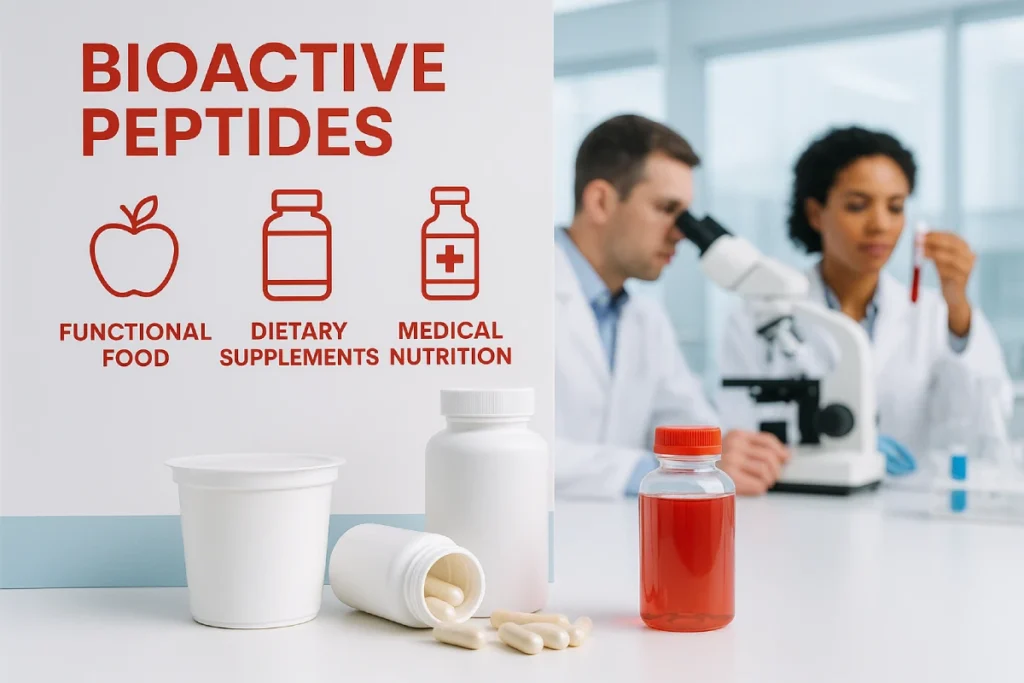
V. Why B2B Brands Choose Bioactive Peptides
B2B brands increasingly adopt bioactive peptides because of:
- Scientific evidence: strong research backing multiple health benefits.
- Consumer demand: growing interest in natural, safe, and effective ingredients.
- Formulation flexibility: soluble, low-dose peptides are easily integrated into products.
- Regulatory compliance and safety: peptides are generally recognized as safe, with some health claims supported in key markets [1][2].
Success Cases:
- A large nutraceutical company used a custom peptide blend to differentiate its product line, capturing additional market share.
- Brands collaborating with EYOSON/PEPDOO® shortened R&D cycles by 30% through tailored peptide solutions.
VI. Partnering with a Reliable Peptide Manufacturer
Choosing the right peptide manufacturer is critical for B2B success. Key considerations include:
- Product quality: high purity and active bioactive peptides.
- Technical capability: advanced production processes and strong R&D.
- Compliance: adherence to GMP, ISO, and other relevant certifications.
- Service capabilities: custom solutions to meet specific brand requirements.
EYOSON/PEPDOO® Advantages:
- Full-range peptide manufacturing (animal, plant, marine).
- Leading patents and industry standard setting in China.
- Internationally advanced peptide technologies (enzyme + fermentation, targeted hydrolysis).
- Certified GMP, ISO, FSSC production systems.
VII. Future Outlook & Market Opportunities
Advances in science and increased consumer health awareness are expanding bioactive peptide applications. Emerging trends include:
- Personalized nutrition: custom peptides based on genetics, lifestyle, and health goals.
- Novel peptide sources: exploration of insects, algae, and other sustainable proteins.
- Functional peptide engineering: structure modification to enhance or create new bioactivities.
These innovations provide B2B brands opportunities to differentiate products, secure patents, and access new markets.
VIII. Conclusion
Bioactive peptides are versatile functional ingredients with multiple biological activities and broad applications. For B2B brands, understanding their definition, sources, functions, and applications, and partnering with a reliable supplier like EYOSON/PEPDOO®, can help secure a competitive advantage. As research progresses and consumer demands evolve, bioactive peptides will play an increasingly critical role in functional nutrition innovation.
Partner with EYOSON for Custom Bioactive Peptide Solutions
Discover tailored bioactive peptide solutions for functional foods, dietary supplements, and medical nutrition. Work with our experts to accelerate your product development and innovation.
Contact EYOSONFAQ
A1: Whey peptides, collagen peptides, and plant-derived peptides such as soy or pea are commonly used. Selection depends on the product format, target health benefit, and regulatory considerations.
A2: Custom peptide formulations can target specific health outcomes, such as immune support, muscle recovery, or skin health. Incorporating clinically validated peptides can enhance brand credibility and market positioning.
A3: Important factors include purity, bioactivity, R&D capabilities, regulatory compliance (GMP, ISO, FSSC), and the ability to provide customized peptide solutions for your product needs.
A4: Most bioactive peptides are recognized as safe when produced under controlled conditions. However, ensure that the peptide source, dosage, and processing method comply with local medical nutrition regulations.
A5: Look for peer-reviewed studies, clinical trials, and supplier-provided efficacy data. Collaborating with a reputable manufacturer like EYOSON/PEPDOO® ensures access to scientifically validated peptides.
References
- Shahidi, F., & Zhong, Y. (2010). Bioactive peptides: Production and functionality. Journal of Functional Foods, 2(1), 1–11.
- Korhonen, H., & Pihlanto, A. (2006). Bioactive peptides: Production and functionality. International Dairy Journal, 16(9), 945–960.
- Hartmann, R., & Meisel, H. (2007). Food-derived peptides with biological activity: From research to food applications. Current Opinion in Biotechnology, 18(2), 163–169.
